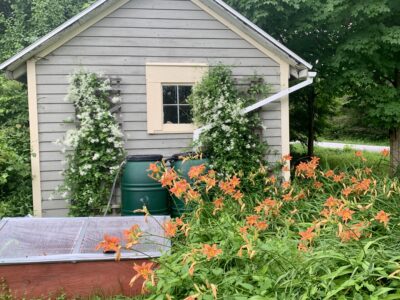I confess to “water anxiety.” I worry about having enough water to last the growing season, especially given the exigencies of climate change. I have this affliction in spite of being blessed with two wells. Like most country dwellers, I have a drilled well (82 feet deep) for household use. I also have a dug well that serviced the original milkhouse (1905), 38 feet deep, hand-set stone, a work of art, with a hand pump, good for lugging water to thirsty trees or flushing toilets when a power failure shuts down the electric pump. Only the latter well has ever run dry.

But to allay my fears and to salve my eco-conscience, I have four rain barrels to collect a free resource off the roof of both my home and milkhouse. Each barrel collects about 50 gallons of chemical- and mineral-free rain water. Unlike the well water, which is “hard,” it is “soft,” and the plants seem to love it, especially indoor plants like orchids and bromeliads. Two hundred gallons is a lot of water for any home gardener.
You can calculate the yield of your roof in gallons by multiplying the square footage of your roof by 623 and dividing by 1000. Or simply: just ¼” of rain on the average roof will fill one 50-gallon rain barrel.1
Rain barrels, these days, are mostly plastic. (My grandfather’s barrels were wooden.) They may be purchased commercially, but all mine were “food grade” plastic containers that my neighbor, who worked for a food distributor, secured for me. They smelled of olives, but I rinsed them with a bleach solution. Reduce! Reuse! Recycle!
Instructions for constructing and connecting your rain barrel to your rain gutters are readily available online. The project is well within the skill set of the home handyman. (I am not one, but have friends who are).
Some gardeners are concerned about the water in rain barrels attracting mosquitoes. I’ve never had a problem, perhaps because my barrels have fitted lids. I understand that there are natural non-toxic “dunks” that will mitigate that problem.
If you intend to attach a hose to your rain barrel – it is great for slow soaking the plants in your garden -- remember that water does not flow uphill! It is also convenient if your barrels are located near your garden or patio or deck.
A full rain barrel is very heavy: about 600 lbs.2 Make sure that your barrels rest on a level and secure base.
You should also have an overflow hose – even if you link two or more barrels together. One of my overflow hoses waters my rose beds. Why waste water?
Empty your barrels and store them before freezing temperatures move in – well after the end of the growing season.
Rain barrels were once a common feature in backyards and on farms, and they seem to be making a comeback. They make economic sense when municipalities are increasing water and sewage fees. Of course, they make environmental sense as well.
And they are an effective cure for water anxiety.
1 howstuffworks.com
2 Ibid.
